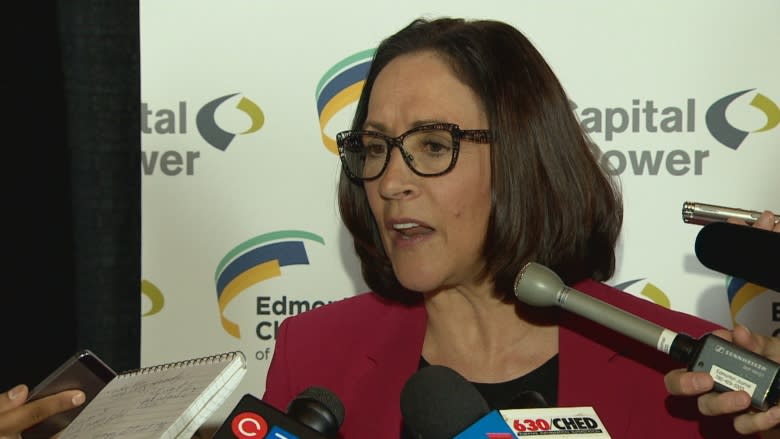Edmonton economy can't rely on pipeline project, mayor tells chamber
Edmonton Mayor Don Iveson says the Trans Mountain pipeline expansion project won't be a "silver bullet" for the city's economy even if it goes ahead.
And the city can no longer count on oilsands development for its economic health, Iveson said in his annual state of the city address Thursday in front of an Edmonton Chamber of Commerce audience at the Shaw Conference Centre.
"The oil sands are not likely to see a return to the frenetic expansion of the last generation," Iveson said.
He said the $7.4-billion Trans Mountain pipeline expansion isn't going to be a "silver bullet for future growth in Edmonton," although he referred to it as an "incredibly important project" for the province and country.
"It is vital for the economy," Iveson said. "It's vital for Albertans getting a fair price for our resources. It's vital for this country and rebuilding our investor confidence.
"But on its own, the Trans Mountain project is not sufficient for long-term economic development in Edmonton."
The contentious project would nearly triple the capacity of the existing Trans Mountain pipeline, which carries diluted bitumen and other products from Edmonton to Burnaby, B.C.
Much like the provincial government in the past several years, the city should be looking to diversify its economy, Iveson said.
"I want us to be bold and actively shape Edmonton's economic future."
Iveson used the term "pipeline" figuratively to describe what he believes Edmonton needs to expand: its export, investment, talent and innovation pipelines.
He said Edmonton needs to invest more in start-up companies, and in the coming year will push for "sizeable investments" from both private and public sectors.
"I'd like to see more Edmontonians participate in some funds that are placing small bets on some really great companies and entrepreneurs, and I'd like to see the flow of those companies increase because we've created the right conditions."
Chamber of Commerce President Janet Riopel thinks the city can do better to create a more ideal environment for business.
"What we need is a really competitive tax and regulatory environment in order for business to succeed," Riopel told media following the mayor's speech. "We have to be faster and better. We have to have reasonable costs."
In Edmonton, commercial or non-residential taxes are higher than in Calgary or the city of Leduc.
Council will start debating the next four-year budget this fall.
At that time, Riopel plans to bring a chamber-led task force to give council tips on how to make Edmonton more business friendly.
The organization Startup Edmonton helps about 65 companies a year get started. "That number needs to increase exponentially," Iveson said. "Tomorrow."
He said that by May 2019, he wants to at least double the number of start-up companies that are assisted each year, and help them be "export-minded from the start."
Currently, 80 per cent of Alberta companies do business strictly within the province.
"That's a high number, even for Canada."
He said Edmontonians need to think globally about markets and open up trade lanes to get "high-value goods like food, pharmaceuticals and precision oil and gas gear to global markets."
He added the Edmonton International Airport is helping open up exports by inviting new cargo routes, particularly with Asia.



